
Previous in Permutation and Combination Next in Permutation and Combination
Question Number 21693 by Tinkutara last updated on 01/Oct/17
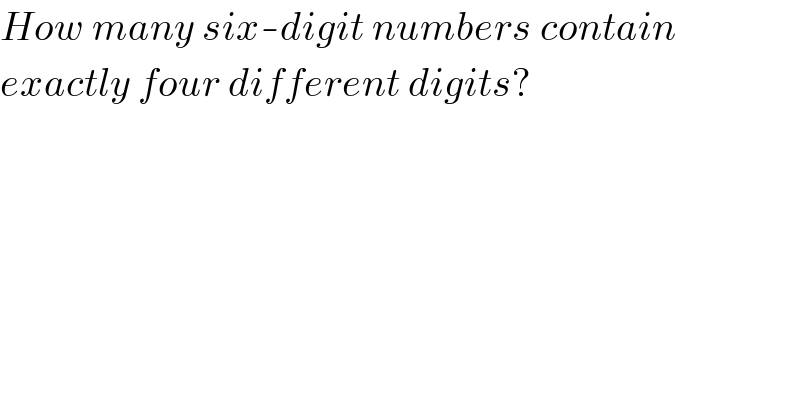
$${How}\:{many}\:{six}-{digit}\:{numbers}\:{contain} \\ $$$${exactly}\:{four}\:{different}\:{digits}? \\ $$
Commented by mrW1 last updated on 02/Oct/17
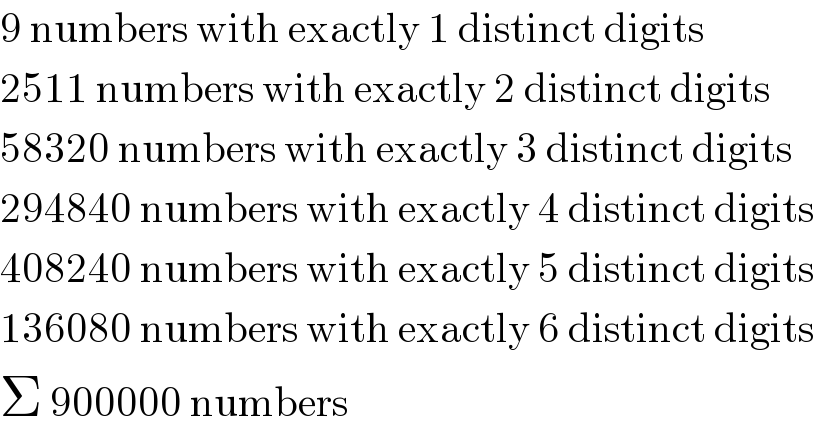
$$\mathrm{9}\:\mathrm{numbers}\:\mathrm{with}\:\mathrm{exactly}\:\mathrm{1}\:\mathrm{distinct}\:\mathrm{digits} \\ $$$$\mathrm{2511}\:\mathrm{numbers}\:\mathrm{with}\:\mathrm{exactly}\:\mathrm{2}\:\mathrm{distinct}\:\mathrm{digits} \\ $$$$\mathrm{58320}\:\mathrm{numbers}\:\mathrm{with}\:\mathrm{exactly}\:\mathrm{3}\:\mathrm{distinct}\:\mathrm{digits} \\ $$$$\mathrm{294840}\:\mathrm{numbers}\:\mathrm{with}\:\mathrm{exactly}\:\mathrm{4}\:\mathrm{distinct}\:\mathrm{digits} \\ $$$$\mathrm{408240}\:\mathrm{numbers}\:\mathrm{with}\:\mathrm{exactly}\:\mathrm{5}\:\mathrm{distinct}\:\mathrm{digits} \\ $$$$\mathrm{136080}\:\mathrm{numbers}\:\mathrm{with}\:\mathrm{exactly}\:\mathrm{6}\:\mathrm{distinct}\:\mathrm{digits} \\ $$$$\Sigma\:\mathrm{900000}\:\mathrm{numbers} \\ $$
Commented by Tinkutara last updated on 02/Oct/17

$$\mathrm{Only}\:\mathrm{4}^{\mathrm{th}} \:\mathrm{line}\:\mathrm{is}\:\mathrm{needed}.\:\mathrm{Can}\:\mathrm{you}\:\mathrm{explain} \\ $$$$\mathrm{how}\:\mathrm{you}\:\mathrm{get}\:\mathrm{it}? \\ $$
Commented by mrW1 last updated on 05/Oct/17
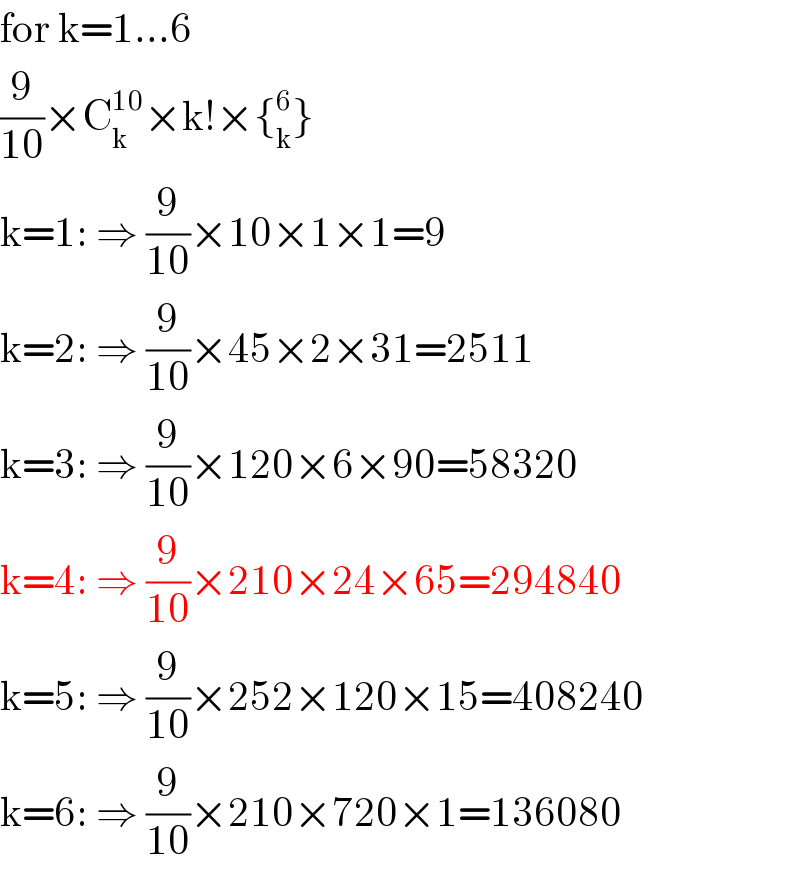
$$\mathrm{for}\:\mathrm{k}=\mathrm{1}...\mathrm{6} \\ $$$$\frac{\mathrm{9}}{\mathrm{10}}×\mathrm{C}_{\mathrm{k}} ^{\mathrm{10}} ×\mathrm{k}!×\left\{_{\mathrm{k}} ^{\mathrm{6}} \right\} \\ $$$$\mathrm{k}=\mathrm{1}:\:\Rightarrow\:\frac{\mathrm{9}}{\mathrm{10}}×\mathrm{10}×\mathrm{1}×\mathrm{1}=\mathrm{9} \\ $$$$\mathrm{k}=\mathrm{2}:\:\Rightarrow\:\frac{\mathrm{9}}{\mathrm{10}}×\mathrm{45}×\mathrm{2}×\mathrm{31}=\mathrm{2511} \\ $$$$\mathrm{k}=\mathrm{3}:\:\Rightarrow\:\frac{\mathrm{9}}{\mathrm{10}}×\mathrm{120}×\mathrm{6}×\mathrm{90}=\mathrm{58320} \\ $$$$\mathrm{k}=\mathrm{4}:\:\Rightarrow\:\frac{\mathrm{9}}{\mathrm{10}}×\mathrm{210}×\mathrm{24}×\mathrm{65}=\mathrm{294840} \\ $$$$\mathrm{k}=\mathrm{5}:\:\Rightarrow\:\frac{\mathrm{9}}{\mathrm{10}}×\mathrm{252}×\mathrm{120}×\mathrm{15}=\mathrm{408240} \\ $$$$\mathrm{k}=\mathrm{6}:\:\Rightarrow\:\frac{\mathrm{9}}{\mathrm{10}}×\mathrm{210}×\mathrm{720}×\mathrm{1}=\mathrm{136080} \\ $$
Commented by mrW1 last updated on 05/Oct/17
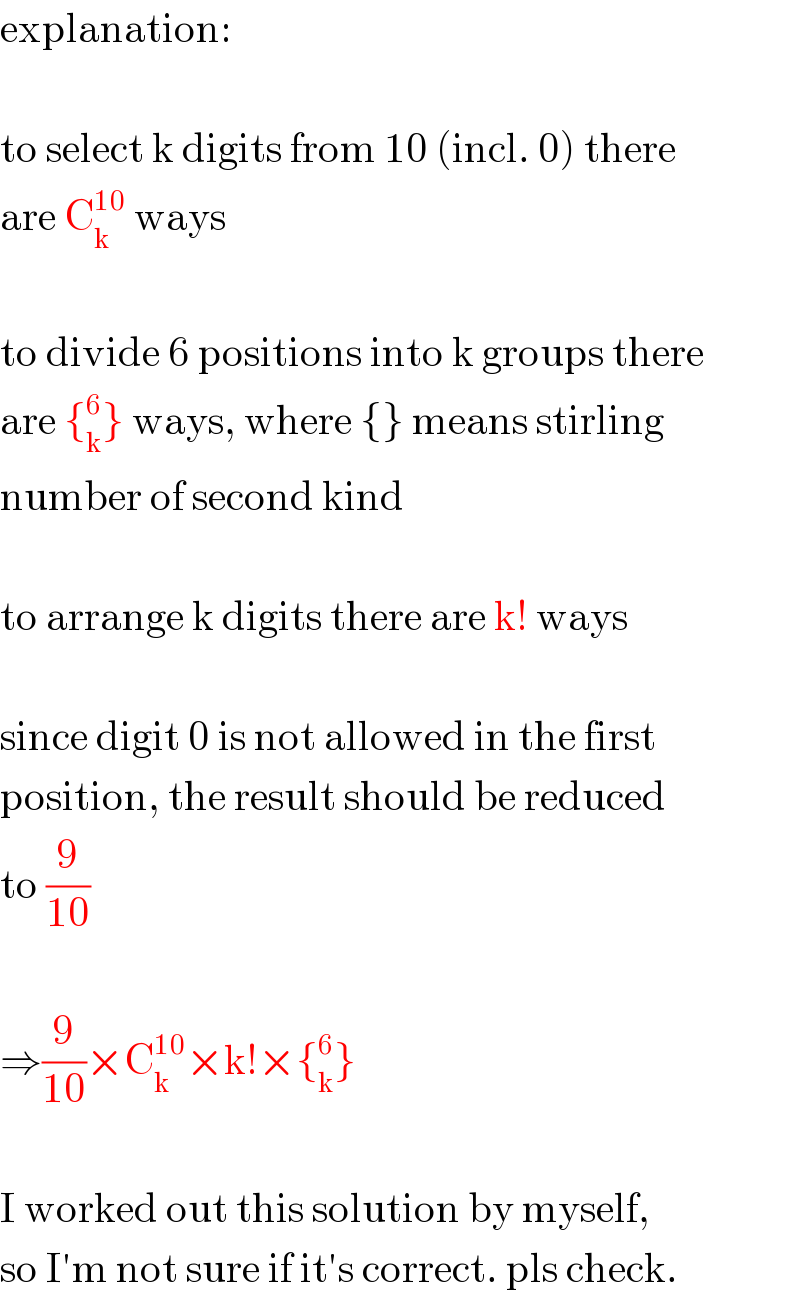
$$\mathrm{explanation}: \\ $$$$ \\ $$$$\mathrm{to}\:\mathrm{select}\:\mathrm{k}\:\mathrm{digits}\:\mathrm{from}\:\mathrm{10}\:\left(\mathrm{incl}.\:\mathrm{0}\right)\:\mathrm{there} \\ $$$$\mathrm{are}\:\mathrm{C}_{\mathrm{k}} ^{\mathrm{10}} \:\mathrm{ways} \\ $$$$ \\ $$$$\mathrm{to}\:\mathrm{divide}\:\mathrm{6}\:\mathrm{positions}\:\mathrm{into}\:\mathrm{k}\:\mathrm{groups}\:\mathrm{there} \\ $$$$\mathrm{are}\:\left\{_{\mathrm{k}} ^{\mathrm{6}} \right\}\:\mathrm{ways},\:\mathrm{where}\:\left\{\right\}\:\mathrm{means}\:\mathrm{stirling} \\ $$$$\mathrm{number}\:\mathrm{of}\:\mathrm{second}\:\mathrm{kind} \\ $$$$ \\ $$$$\mathrm{to}\:\mathrm{arrange}\:\mathrm{k}\:\mathrm{digits}\:\mathrm{there}\:\mathrm{are}\:\mathrm{k}!\:\mathrm{ways} \\ $$$$ \\ $$$$\mathrm{since}\:\mathrm{digit}\:\mathrm{0}\:\mathrm{is}\:\mathrm{not}\:\mathrm{allowed}\:\mathrm{in}\:\mathrm{the}\:\mathrm{first} \\ $$$$\mathrm{position},\:\mathrm{the}\:\mathrm{result}\:\mathrm{should}\:\mathrm{be}\:\mathrm{reduced} \\ $$$$\mathrm{to}\:\frac{\mathrm{9}}{\mathrm{10}} \\ $$$$ \\ $$$$\Rightarrow\frac{\mathrm{9}}{\mathrm{10}}×\mathrm{C}_{\mathrm{k}} ^{\mathrm{10}} ×\mathrm{k}!×\left\{_{\mathrm{k}} ^{\mathrm{6}} \right\} \\ $$$$ \\ $$$$\mathrm{I}\:\mathrm{worked}\:\mathrm{out}\:\mathrm{this}\:\mathrm{solution}\:\mathrm{by}\:\mathrm{myself}, \\ $$$$\mathrm{so}\:\mathrm{I}'\mathrm{m}\:\mathrm{not}\:\mathrm{sure}\:\mathrm{if}\:\mathrm{it}'\mathrm{s}\:\mathrm{correct}.\:\mathrm{pls}\:\mathrm{check}. \\ $$
Commented by Tinkutara last updated on 05/Oct/17

$$\mathrm{I}\:\mathrm{don}'\mathrm{t}\:\mathrm{know}\:\mathrm{any}\:\mathrm{sterling}\:\mathrm{function}. \\ $$
Commented by mrW1 last updated on 05/Oct/17
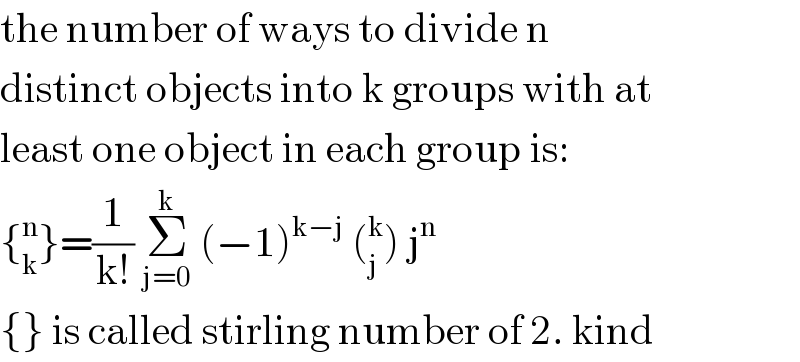
$$\mathrm{the}\:\mathrm{number}\:\mathrm{of}\:\mathrm{ways}\:\mathrm{to}\:\mathrm{divide}\:\mathrm{n} \\ $$$$\mathrm{distinct}\:\mathrm{objects}\:\mathrm{into}\:\mathrm{k}\:\mathrm{groups}\:\mathrm{with}\:\mathrm{at} \\ $$$$\mathrm{least}\:\mathrm{one}\:\mathrm{object}\:\mathrm{in}\:\mathrm{each}\:\mathrm{group}\:\mathrm{is}: \\ $$$$\left\{_{\mathrm{k}} ^{\mathrm{n}} \right\}=\frac{\mathrm{1}}{\mathrm{k}!}\:\underset{\mathrm{j}=\mathrm{0}} {\overset{\mathrm{k}} {\sum}}\:\left(−\mathrm{1}\right)^{\mathrm{k}−\mathrm{j}} \:\left(_{\mathrm{j}} ^{\mathrm{k}} \right)\:\mathrm{j}^{\mathrm{n}} \\ $$$$\left\{\right\}\:\mathrm{is}\:\mathrm{called}\:\mathrm{stirling}\:\mathrm{number}\:\mathrm{of}\:\mathrm{2}.\:\mathrm{kind} \\ $$
Commented by mrW1 last updated on 05/Oct/17

Commented by Tinkutara last updated on 05/Oct/17

$$\mathrm{Thank}\:\mathrm{you}\:\mathrm{very}\:\mathrm{much}\:\mathrm{Sir}! \\ $$
Commented by mrW1 last updated on 06/Oct/17

$$\mathrm{what}\:\mathrm{is}\:\mathrm{the}\:\mathrm{solution}\:\mathrm{in}\:\mathrm{your}\:\mathrm{book}? \\ $$
Commented by Tinkutara last updated on 06/Oct/17

$$\mathrm{Its}\:\mathrm{very}\:\mathrm{confusing}\:\mathrm{but}\:\mathrm{the}\:\mathrm{one}\:\mathrm{which}\:\mathrm{I} \\ $$$$\mathrm{understand}\:\mathrm{is}: \\ $$
Commented by Tinkutara last updated on 06/Oct/17

Commented by Tinkutara last updated on 06/Oct/17

Commented by Tinkutara last updated on 06/Oct/17

Commented by Tinkutara last updated on 06/Oct/17

Commented by mrW1 last updated on 06/Oct/17

$$\mathrm{the}\:\mathrm{result}\:\mathrm{is}\:\mathrm{the}\:\mathrm{same}.\:\mathrm{my}\:\mathrm{formula} \\ $$$$\frac{\mathrm{9}}{\mathrm{10}}×\left(_{\:\:\mathrm{4}} ^{\mathrm{10}} \right)×\mathrm{4}!×\left\{_{\mathrm{4}} ^{\mathrm{6}} \right\}\:\mathrm{is}\:\mathrm{more}\:\mathrm{simple}. \\ $$
